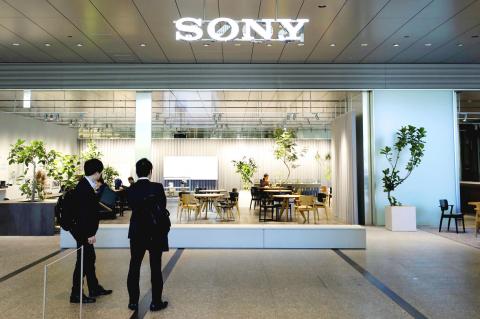Japan’s Sony Corp yesterday said that robust games and entertainment divisions had pushed annual profit to a second consecutive record high, but warned of a looming downturn in its bottom line.
The PlayStation manufacturer also said the integration of EMI Music Publishing as a fully-owned subsidiary had played well.
Net profit rose 86.7 percent to ¥916.3 billion (US$8.2 billion) in the year that ended on March 31, while operating profit climbed 21.7 percent to ¥894.2 billion.

Photo: Bloomberg
Sales edged up 1.4 percent to ¥8.7 trillion.
However, the future is looking less bright as this year’s one-off boost partly from integrating EMI would make annual comparisons less rosy, the company said.
Net profit for the current fiscal year ending in March 2020 are forecast to drop 45 percent to ¥500 billion, with operating profit sagging 9 percent to ¥810 billion, company data showed.
However, sales are expected to grow 1.5 percent to ¥8.8 trillion.
“Sony had achieved a V-shape recovery until the last fiscal year, but its growth is expected to slow down in the current fiscal year,” said Hideki Yasuda, an analyst at Ace Research Institute in Tokyo.
“PS4, which spearheaded Sony’s revival, is now peaking out, while its mobile phone businesses are expected to continue squeezing profits,” he said.
Sony continued to struggle in the mobile business with its operating loss more than tripling to ¥97 billion because of reduced smartphone sales.
Profits also fell in Sony’s semiconductor and financial services businesses.
However, it enjoyed strong growth in its games and network businesses, including an online service that allows users to enjoy music and video titles via their PlayStation accounts.
Operating profit in that sector soared 75 percent to ¥311 billion.
Revenue from PlayStation4 consoles fell, but software sales and network services logged robust rises.
Sony said it expects revenue from this core sector would sag due to a continued fall in game hardware sales, costs to develop the next-generation console and unfavorable foreign exchange rates.
Yasuo Imanaka, an analyst at Rakuten Securities in Tokyo, said Sony’s game business also faces a threat from new entrants in the sector.
“Google’s Stadia can be a powerful rival. Sony is expected to launch PS5 in the near future, but may have to review its game business strategy due to the emergence of Stadia,” he said.
The Stadia platform would let gamers stream blockbuster titles to any device they wish.
Separately, Japanese games giant Nintendo Co yesterday said it was working with Chinese Internet firm Tencent Holdings Ltd (騰訊) to roll out its popular Switch console in China, confirming rumors that have dramatically pushed up its share price.
“Nintendo ... is announcing that a collaboration is in progress with Tencent Holdings Limited ... to release the Nintendo Switch video game system in China,” the firm said in a brief statement.
The Switch has become a huge global seller, helped by the release of innovative, family-friendly titles that have wowed critics and gamers alike.

Three experts in the high technology industry have said that US President Donald Trump’s pledge to impose higher tariffs on Taiwanese semiconductors is part of an effort to force Taiwan Semiconductor Manufacturing Co (TSMC, 台積電) to the negotiating table. In a speech to Republicans on Jan. 27, Trump said he intends to impose tariffs on Taiwan to bring chip production to the US. “The incentive is going to be they’re not going to want to pay a 25, 50 or even a 100 percent tax,” he said. Darson Chiu (邱達生), an economics professor at Taichung-based Tunghai University and director-general of

‘LEGACY CHIPS’: Chinese companies have dramatically increased mature chip production capacity, but the West’s drive for secure supply chains offers a lifeline for Taiwan When Powerchip Technology Corp (力晶科技) entered a deal with the eastern Chinese city of Hefei in 2015 to set up a new chip foundry, it hoped the move would help provide better access to the promising Chinese market. However, nine years later, that Chinese foundry, Nexchip Semiconductor Corp (合晶集成), has become one of its biggest rivals in the legacy chip space, leveraging steep discounts after Beijing’s localization call forced Powerchip to give up the once-lucrative business making integrated circuits for Chinese flat panels. Nexchip is among Chinese foundries quickly winning market share in the crucial US$56.3 billion industry of so-called legacy

Hon Hai Precision Industry Co (鴻海精密) is reportedly making another pass at Nissan Motor Co, as the Japanese automaker's tie-up with Honda Motor Co falls apart. Nissan shares rose as much as 6 percent after Taiwan’s Central News Agency reported that Hon Hai chairman Young Liu (劉揚偉) instructed former Nissan executive Jun Seki to connect with French carmaker Renault SA, which holds about 36 percent of Nissan’s stock. Hon Hai, the Taiwanese iPhone-maker also known as Foxconn Technology Group (富士康科技集團), was exploring an investment or buyout of Nissan last year, but backed off in December after the Japanese carmaker penned a deal

WASHINGTON POLICY: Tariffs of 10 percent or more and other new costs are tipped to hit shipments of small parcels, cutting export growth by 1.3 percentage points The decision by US President Donald Trump to ban Chinese companies from using a US tariff loophole would hit tens of billions of dollars of trade and reduce China’s economic growth this year, according to new estimates by economists at Nomura Holdings Inc. According to Nomura’s estimates, last year companies such as Shein (希音) and PDD Holdings Inc’s (拼多多控股) Temu shipped US$46 billion of small parcels to the US to take advantage of the rule that allows items with a declared value under US$800 to enter the US tariff-free. Tariffs of 10 percent or more and other new costs would slash such